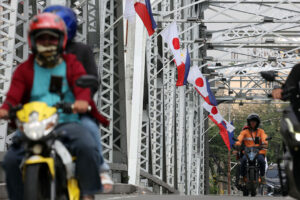PHL Senate to OK military pact with Japan by year-end
THE SENATE plans to ratify the Philippines’ reciprocal access agreement with Japan by year-end despite being busy with next year’s national budget, according to the Senate president.

By John Victor D. Ordoñez, Reporter
THE SENATE plans to ratify the Philippines’ reciprocal access agreement with Japan by year-end despite being busy with next year’s national budget, according to the Senate president.
At a forum with foreign journalists, Senate President Francis “Chiz” G. Escudero said they have enough time to take up the military pact in between deliberations on the national spending plan.
“Personally, I don’t see any reason why this should not be (ratified by the Senate),” he said. “Given the long queue of departments that need to be scrutinized, there’s usually a lull and we usually, by traditional practice, take up topics of legislation to maximize the time of the Senate.”
He said he is confident senators would back the deal when the chamber takes it up in session.
The Philippines and Japan signed the military pact in July to ease the entry of equipment and troops for combat training from Japan and to ensure stability in the region amid growing tensions with China.
The agreement is the first of its kind to be signed by Japan in Asia and coincides with increased Chinese assertiveness in the South China Sea, where Beijing’s expansive claims conflict with those of several Southeast Asian nations.
The treaty will take effect after being ratified by both countries’ Parliaments.
“Hopefully, this is ratified soon so we can get the implementing rules and regulations,” Philippine Defense Secretary Gilberto Eduardo Gerardo C. Teodoro, Jr. told reporters.
The Philippines has a visiting forces agreement with the United States and Australia. Tokyo, which hosts the biggest concentration of US forces abroad, has a similar deal with Australia and Britain, and is negotiating another with France.
A United Nations-backed tribunal based in the Hague in 2016 voided China’s expansive claims in the South China Sea for being illegal.
Beijing insists it has sovereignty over most of the South China Sea based on its old maps and has deployed hundreds of coast guard vessels deep into Southeast Asia to assert its claims, disrupting offshore energy and fishing activities of its neighbors including Malaysia and Vietnam.
Japanese Foreign Minister Yoko Kamikawa earlier told a news briefing during her visit to Manila that the defense pact is not targeted against any country.
Tokyo is committed to providing the Philippines with more patrol vessels and surveillance radar systems that can be deployed in the South China Sea, she said.
“In any long-standing relationship there would be disagreements,” Mr. Escudero said, referring to Manila’s sea dispute with Beijing. “The challenge is how, without really changing your position, to concentrate on and to focus on what you agree on and what you can work on together.”












